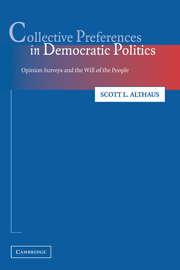Book contents
- Frontmatter
- Contents
- List of Figures and Tables
- Acknowledgments
- 1 Introduction
- PART I ILLUSIONS OF AGGREGATION
- PART II INFORMATION EFFECTS IN COLLECTIVE PREFERENCES
- PART III OPINION SURVEYS IN DEMOCRATIC POLITICS
- 7 Opinion Surveys and the Will of the People
- 8 What Surveys Can Tell Us about Public Opinion
- Appendix A Political Knowledge Indices
- Appendix B Methodology
- References
- Index
7 - Opinion Surveys and the Will of the People
Published online by Cambridge University Press: 06 January 2010
- Frontmatter
- Contents
- List of Figures and Tables
- Acknowledgments
- 1 Introduction
- PART I ILLUSIONS OF AGGREGATION
- PART II INFORMATION EFFECTS IN COLLECTIVE PREFERENCES
- PART III OPINION SURVEYS IN DEMOCRATIC POLITICS
- 7 Opinion Surveys and the Will of the People
- 8 What Surveys Can Tell Us about Public Opinion
- Appendix A Political Knowledge Indices
- Appendix B Methodology
- References
- Index
Summary
Socrates: My good Crito, why should we care so much for what the majority think? The most reasonable people, to whom one should pay more attention, will believe that things were done as they were done.
Crito: You see, Socrates, that one must also pay attention to the opinion of the majority. Your present situation makes clear that the majority can inflict not the least but pretty well the greatest evils if one is slandered among them.
Socrates: Would that the majority could inflict the greatest evils, for they would then be capable of the greatest good, and that would be fine, but now they cannot do either. They cannot make a man either wise or foolish, but they inflict things haphazardly.
– Plato, CritoPlato's Crito presents a jail-cell dialogue between Socrates and his friend, Crito, over the propriety of the death sentence handed down against Socrates by the citizens of Athens. He could flee into exile, as Crito urges, or stay and be executed. Both agree that the trial, carried out in front of 501 jurors chosen by lot, was conducted fairly. At issue is the quality of the verdict. Those citizens who were most knowledgeable about the circumstances leading up to the charges voted to exonerate Socrates. Crito and Socrates agree that if every juror were as well informed as the most knowledgeable jurors, Socrates surely would have been acquitted.
- Type
- Chapter
- Information
- Collective Preferences in Democratic PoliticsOpinion Surveys and the Will of the People, pp. 243 - 276Publisher: Cambridge University PressPrint publication year: 2003
- 1
- Cited by



